LeetCode-in-Java
3531. Count Covered Buildings
Medium
You are given a positive integer n, representing an n x n city. You are also given a 2D grid buildings, where buildings[i] = [x, y] denotes a unique building located at coordinates [x, y].
A building is covered if there is at least one building in all four directions: left, right, above, and below.
Return the number of covered buildings.
Example 1:

Input: n = 3, buildings = [[1,2],[2,2],[3,2],[2,1],[2,3]]
Output: 1
Explanation:
- Only building
[2,2]is covered as it has at least one building:- above (
[1,2]) - below (
[3,2]) - left (
[2,1]) - right (
[2,3])
- above (
- Thus, the count of covered buildings is 1.
Example 2:

Input: n = 3, buildings = [[1,1],[1,2],[2,1],[2,2]]
Output: 0
Explanation:
- No building has at least one building in all four directions.
Example 3:

Input: n = 5, buildings = [[1,3],[3,2],[3,3],[3,5],[5,3]]
Output: 1
Explanation:
- Only building
[3,3]is covered as it has at least one building:- above (
[1,3]) - below (
[5,3]) - left (
[3,2]) - right (
[3,5])
- above (
- Thus, the count of covered buildings is 1.
Constraints:
2 <= n <= 1051 <= buildings.length <= 105buildings[i] = [x, y]1 <= x, y <= n- All coordinates of
buildingsare unique.
Solution
import java.util.Arrays;
public class Solution {
private int helper(int[][] buildings, int n) {
int[] minRow = new int[n + 1];
int[] maxRow = new int[n + 1];
int[] minCol = new int[n + 1];
int[] maxCol = new int[n + 1];
Arrays.fill(minRow, n + 1);
Arrays.fill(minCol, n + 1);
for (int[] b : buildings) {
int x = b[0];
int y = b[1];
minRow[x] = Math.min(minRow[x], y);
maxRow[x] = Math.max(maxRow[x], y);
minCol[y] = Math.min(minCol[y], x);
maxCol[y] = Math.max(maxCol[y], x);
}
int ans = 0;
for (int[] arr : buildings) {
int x = arr[0];
int y = arr[1];
if (minRow[x] < y && maxRow[x] > y && minCol[y] < x && maxCol[y] > x) {
ans++;
}
}
return ans;
}
public int countCoveredBuildings(int n, int[][] buildings) {
return helper(buildings, n);
}
}

